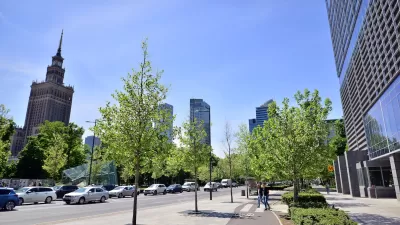The city of Milwaukee is repairing its streets and making them more bike and pedestrian friendly in the process.

Milwaukee is undertaking a large-scale repair and update of its streets according to Dave Schlabowske in Urban Milwaukee. "The repairs are designed to last seven to 10 years, and the city has been able to resurface more than 60 miles of streets," Schlabowske tell us. Most of these streets include bike lanes.
Like many cities in the Midwest, Milwaukee's population has been flat or shrinking for more than 50 years. So many of these streets don’t carry the previous volume of traffic and are in need of modernization. "When an arterial street is resurfaced as part of the rapid fix program, the city evaluates current traffic volumes and is able to make some geometric updates if needed using the new pavement marking patterns. In many cases these roadways were widened decades ago to serve our then growing traffic volumes during Milwaukee’s industrial heyday when thousands of factory workers began driving to work in large factories," Schlaboske reports. These modernizations include making lanes more narrow to reduce speed of cars and to protect pedestrians, as well as adding bike lanes and making other improvements.
Schlabowske, who is involved with the Bike Federation of Wisconsin, says, "We applaud that commitment, but look forward to the first new protected bike lanes, neighborhood greenways network (sometimes called bicycle boulevards, or safe streets) or other next generation bicycle improvements to encourage more people to ride in Milwaukee." I agree.
FULL STORY: City Streets Makeover Adds Bike Lanes

Maui's Vacation Rental Debate Turns Ugly
Verbal attacks, misinformation campaigns and fistfights plague a high-stakes debate to convert thousands of vacation rentals into long-term housing.

Planetizen Federal Action Tracker
A weekly monitor of how Trump’s orders and actions are impacting planners and planning in America.

In Urban Planning, AI Prompting Could be the New Design Thinking
Creativity has long been key to great urban design. What if we see AI as our new creative partner?

Pedestrian Deaths Drop, Remain Twice as High as in 2009
Fatalities declined by 4 percent in 2024, but the U.S. is still nowhere close to ‘Vision Zero.’

King County Supportive Housing Program Offers Hope for Unhoused Residents
The county is taking a ‘Housing First’ approach that prioritizes getting people into housing, then offering wraparound supportive services.

Researchers Use AI to Get Clearer Picture of US Housing
Analysts are using artificial intelligence to supercharge their research by allowing them to comb through data faster. Though these AI tools can be error prone, they save time and housing researchers are optimistic about the future.
Urban Design for Planners 1: Software Tools
This six-course series explores essential urban design concepts using open source software and equips planners with the tools they need to participate fully in the urban design process.
Planning for Universal Design
Learn the tools for implementing Universal Design in planning regulations.
planning NEXT
Appalachian Highlands Housing Partners
Mpact (founded as Rail~Volution)
City of Camden Redevelopment Agency
City of Astoria
City of Portland
City of Laramie





























